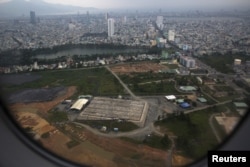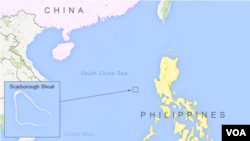When Ted Osius came to Vietnam as a U.S. diplomat in the 1990s, he was forbidden from discussing Agent Orange, the defoliant that America doused on its enemy in the Vietnam War.
Two decades later, U.S. policy has done an about-face. Osius, now the U.S. ambassador to Vietnam, oversees joint efforts to expunge dioxin from Vietnamese soil and care for locals who suffered from exposure to the chemical.
“We turned what was a place of great contention into an area where we are collaborating a great deal with Vietnam,” Osius said Thursday at a conference marking 20 years of bilateral relations. “And we’re having an honest discussion about our past. And my belief is the only way to get past the past is if you’re honest about it.”
Metamorphosis
As Washington takes responsibility for its history, the Agent Orange turnaround demonstrates the thorough metamorphosis Vietnam-U.S. ties have undergone. With war in the rear-view mirror, the two countries have ramped up trade and educational exchanges, voiced similar concerns about China’s ascent in the region, and burned through the kilometers for high-level state visits.
On commerce, Hanoi and Washington were the first to complete bilateral talks for the 12-nation Trans Pacific Partnership trade deal. The TPP would bolster the U.S.-Vietnam friendship, but officials on both sides try to temper the notion that this friendship is meant to counterbalance China. At the conference, former Foreign Minister Nguyen Dy Nien dismissed what he called “rumors” that territorial conflicts are pushing Vietnam into U.S. arms.
“It’s not because we take advantage of this relationship to counterweight the other side,” Nien said. “That is not our policy.”
The countries are warming up to each other for their overall benefit, he said. Nien lit incense last year when U.S. President Barack Obama hosted a Vietnamese communist party secretary, a first for the White House. “My heart was touched,” Nien said.
TPP, South China Sea
But China also makes the TPP more appealing to Vietnam, which imported $4.2 billion worth of goods from China in November, compared with exports worth $1.5 billion, according to Vietnam’s General Statistics Office. To rely less on its longtime "frenemy" and narrow the trade deficit with China, Vietnam would find alternative trading partners in the TPP.
Both Washington and Hanoi also have a common worry that Beijing is moving more vigorously into the disputed South China Sea. This month China test-landed aircraft on Fiery Cross Reef, part of an island it built from scratch in the sea.
As China rises, former Minister of Industry and Trade Truong Dinh Tuyen alluded to the TPP as a way for the United States to flex its power in Asia.
“I think the U.S. needs the TPP more than Vietnam does,” he said.
If Washington is leery of Beijing, other Southeast Asian nations might seem like more obvious partners than its erstwhile war foe Hanoi. The Philippines has a military alliance with the United States. Thailand has been a longtime friend. Indonesia manages the region’s biggest economy. None of them are in the TPP.
But several analysts argue these neighboring countries haven’t shown the political will to tear down protectionist barriers. Vietnam, by contrast, has “repeatedly stepped up to the plate to reform its economy,” said Asia Society Policy Institute vice president Wendy Cutler.
Investment in future
Cutler urged Vietnam to invest in more skills training, research, infrastructure, and technology to boost its productivity and climb up the value chain.
Vietnam has a request for the United States, too. It wants to be recognized as having a market economy, which would spare it from some anti-dumping lawsuits. Some view Vietnam’s price caps and fixed currency rates as non-market controls. Yet the U.S. policy of quantitative easing has also been likened to currency manipulation because the government’s money-printing affects exchange rates.
In the meantime, Vietnam and the United States are making progress in other areas. For instance, the United States spends roughly $10 million a year to rid Vietnam of unexploded war ordnance. In nine provinces it provides aid to Vietnamese with disabilities potentially linked to the war, and Osius said he pushes for more support whenever he returns to Washington.






